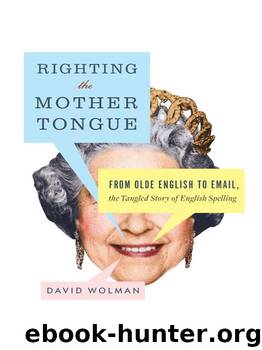Righting the Mother Tongue: From Olde English to Email, the Tangled Story of English Spelling by Wolman David

Author:Wolman, David [Wolman, David]
Language: eng
Format: mobi
Publisher: HarperCollins
Published: 2008-09-23T16:00:00+00:00
ANDREW CARNEGIE ENDOWED the Simplified Spelling Board to the tune of about twenty-five thousand dollars a year for the decade beginning in 1906.25 In what appears to have been just that initial dinner with Dewey and a few follow-up meetings, the librarian-metric-system-enthusiast-spelling-reform advocate had talked the tycoon out of parting with an impressive sum. Of course, from Dewey’s perspective, Carnegie’s backing was no lucky strike. It was another step toward the inevitable new orthography. The details of the new spelling system were beside the point; the current one was a mess, everybody knew it, and with enough political and public support, a better one could be crafted and strategically implemented.
During his first year or two supporting the Simplified Spelling Board, Carnegie most likely wanted to see what this “language commission” could accomplish. In the vernacular of today’s venture philanthropy, his donations were seed money. That he went well beyond just a year or two of support reveals Carnegie’s commitment to the cause and his trust of, and patience with, Dewey’s plodding campaign.
Carnegie’s endorsement and dollars were a huge boost for the members of the Board. Spelling reform had now reached the upper echelons of academia and the private sector, and it was about to do the same in government. In August 1906, President Theodore Roosevelt ordered the federal printing office to use three hundred novel spellings, as prescribed by the Simplified Spelling Board. Dasht (from dashed), deposit (from deposite), good-by (from goodbye, not goodbye), instil (from instill), prest (from pressed), surprize (from surprise), thorofare (from thoroughfare), and vizor (from visor). A few months earlier, Roosevelt had written Columbia professor and Board member, James Brander Matthews, to let him know that the president’s personal secretary, William Loeb, “himself an advanced spelling reformer, will hereafter see that the President, in his correspondence, spells the way you say he ought to!”26
Roosevelt himself wasn’t much of a speller, and the arguments set forth by Dewey and his crew resonated with the president’s idea of common sense. Advocates of orthographic reform had pointed out, rather shrewdly, that qualified applicants to the federal office of the Civil Service Commission had been rejected because of spelling errors. Roosevelt had served in the Commission, and the Simplifiers may have been playing to his interests.27 Roosevelt also fraternized with some of the key players, including Matthews, whom he had invited to the White House, and Carnegie, who had once called Roosevelt a “prince in the republic of letters.”*28
After the presidential edict, the Associated Press reported on August 28 that “an official list of the 300 reformed words reached the executive office yesterday,” and that “a meeting called by Public Printer [Charles] Stillings, of all the chief clerks of the various departments, and a committee was appointed to formulate rules for carrying out this order.”29 The president’s letter to Stillings enclosed the circular published by the Simplified Spelling Board, more copies of which, Roosevelt informed Stillings, “can be obtained free from the Board at No. 1 Madison Avenue, New York City.
Download
This site does not store any files on its server. We only index and link to content provided by other sites. Please contact the content providers to delete copyright contents if any and email us, we'll remove relevant links or contents immediately.
Cecilia; Or, Memoirs of an Heiress — Volume 1 by Fanny Burney(32527)
Cecilia; Or, Memoirs of an Heiress — Volume 2 by Fanny Burney(31928)
Cecilia; Or, Memoirs of an Heiress — Volume 3 by Fanny Burney(31916)
The Lost Art of Listening by Michael P. Nichols(7476)
Asking the Right Questions: A Guide to Critical Thinking by M. Neil Browne & Stuart M. Keeley(5739)
We Need to Talk by Celeste Headlee(5594)
On Writing A Memoir of the Craft by Stephen King(4911)
Dialogue by Robert McKee(4372)
Pre-Suasion: A Revolutionary Way to Influence and Persuade by Robert Cialdini(4194)
I Have Something to Say: Mastering the Art of Public Speaking in an Age of Disconnection by John Bowe(3864)
Elements of Style 2017 by Richard De A'Morelli(3331)
The Book of Human Emotions by Tiffany Watt Smith(3282)
Fluent Forever: How to Learn Any Language Fast and Never Forget It by Gabriel Wyner(3066)
Name Book, The: Over 10,000 Names--Their Meanings, Origins, and Spiritual Significance by Astoria Dorothy(2962)
Why I Write by George Orwell(2933)
Good Humor, Bad Taste: A Sociology of the Joke by Kuipers Giselinde(2931)
The Art Of Deception by Kevin Mitnick(2780)
The Grammaring Guide to English Grammar with Exercises by Péter Simon(2728)
Ancient Worlds by Michael Scott(2659)
